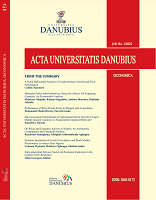Pro-Poorness of Child’s Multidimensional Welfare in South Africa Using the Alkire-Foster and Fuzzy Sets Approaches
Pro-Poorness of Child’s Multidimensional Welfare in South Africa Using the Alkire-Foster and Fuzzy Sets Approaches
Author(s): Thonaeng Charity Molelekoa, Abayomi Samuel OyekaleSubject(s): Micro-Economics, Socio-Economic Research
Published by: Editura Universitară Danubius
Keywords: Multidimensional Pro-Poor Growth; Child; PEGR; PPGI;
Summary/Abstract: The multidimensional notion of poverty has been widely emphasized in development economic literature. However, very little is known on the pro-poorness of children’s multidimensional welfare in South Africa. This study therefore analyzed the multidimensional welfare indicators of South African children and their pro-poorness. The data were the General Household Survey (GHS) for 2017, 2018 and 2019. Child’s poverty indicators were computed with Alkire-Foster and fuzzy set approaches. These were transformed into multidimensional wealth indicators (MWIs) and analyzed using the pro-poor growth index (PPGI) and poverty equivalent growth rate (PEGR). The results revealed that the fuzzy MWIs were pro-poor between 2017 and 2018 with PPGI of 1.33, 1.84 and 2.56 for poverty incidence, depth and severity, respectively, but only pro-poor for poverty incidence in 2018/2019 with PPGI of 1.714. The fuzzy MWIs were largely pro-poor among Black/African, White, and those who resided in traditional areas between 2017 and 2019. It was concluded that although interventions to reduce poverty in South Africa had shown some level of pro-poorness, multidimensional poverty is still high among children. Also, analysis of pro-poor growth with multidimensional approach is highly sensitive to the adopted welfare computation approach.
Journal: Acta Universitatis Danubius. Œconomica
- Issue Year: 19/2023
- Issue No: 4
- Page Range: 95-112
- Page Count: 18
- Language: English

